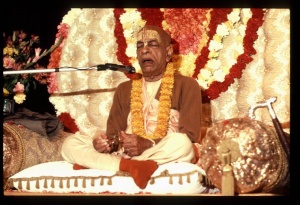CC Adi 17.208: Difference between revisions
No edit summary |
(Vanibot #0054 edit - transform synonyms into clickable links, which search similar occurrences) |
||
| Line 17: | Line 17: | ||
<div class="synonyms"> | <div class="synonyms"> | ||
''nā jāni'' | ''[//vanipedia.org/wiki/Special:VaniSearch?s=nā&tab=syno_o&ds=1 nā] [//vanipedia.org/wiki/Special:VaniSearch?s=jāni&tab=syno_o&ds=1 jāni]'' — we do not know; ''[//vanipedia.org/wiki/Special:VaniSearch?s=ki&tab=syno_o&ds=1 ki]'' — what; ''[//vanipedia.org/wiki/Special:VaniSearch?s=khāñā&tab=syno_o&ds=1 khāñā]'' — eating; ''[//vanipedia.org/wiki/Special:VaniSearch?s=matta&tab=syno_o&ds=1 matta]'' — mad; ''[//vanipedia.org/wiki/Special:VaniSearch?s=hañā&tab=syno_o&ds=1 hañā]'' — becoming; ''[//vanipedia.org/wiki/Special:VaniSearch?s=nāce&tab=syno_o&ds=1 nāce]'' — He dances; ''[//vanipedia.org/wiki/Special:VaniSearch?s=gāya&tab=syno_o&ds=1 gāya]'' — chants; ''[//vanipedia.org/wiki/Special:VaniSearch?s=hāse&tab=syno_o&ds=1 hāse]'' — laughs; ''[//vanipedia.org/wiki/Special:VaniSearch?s=kānde&tab=syno_o&ds=1 kānde]'' — cries; ''[//vanipedia.org/wiki/Special:VaniSearch?s=paḍe&tab=syno_o&ds=1 paḍe]'' — falls down; ''[//vanipedia.org/wiki/Special:VaniSearch?s=uṭhe&tab=syno_o&ds=1 uṭhe]'' — gets up; ''[//vanipedia.org/wiki/Special:VaniSearch?s=gaḍāgaḍi&tab=syno_o&ds=1 gaḍāgaḍi] [//vanipedia.org/wiki/Special:VaniSearch?s=yāya&tab=syno_o&ds=1 yāya]'' — goes rolling on the ground. | ||
</div> | </div> | ||
Latest revision as of 18:39, 19 February 2024
Śrī Caitanya-caritāmṛta - Ādi-līlā - Chapter 17: The Pastimes of Lord Caitanya Mahāprabhu in His Youth

His Divine Grace
A.C. Bhaktivedanta Swami Prabhupada
A.C. Bhaktivedanta Swami Prabhupada
TEXT 208
- nā jāni,—ki khāñā matta hañā nāce, gāya
- hāse, kānde, paḍe, uṭhe, gaḍāgaḍi yāya
SYNONYMS
nā jāni — we do not know; ki — what; khāñā — eating; matta — mad; hañā — becoming; nāce — He dances; gāya — chants; hāse — laughs; kānde — cries; paḍe — falls down; uṭhe — gets up; gaḍāgaḍi yāya — goes rolling on the ground.
TRANSLATION
“‘We do not know what He eats that makes Him become mad, dancing, singing, sometimes laughing, crying, falling down, jumping up and rolling on the ground.